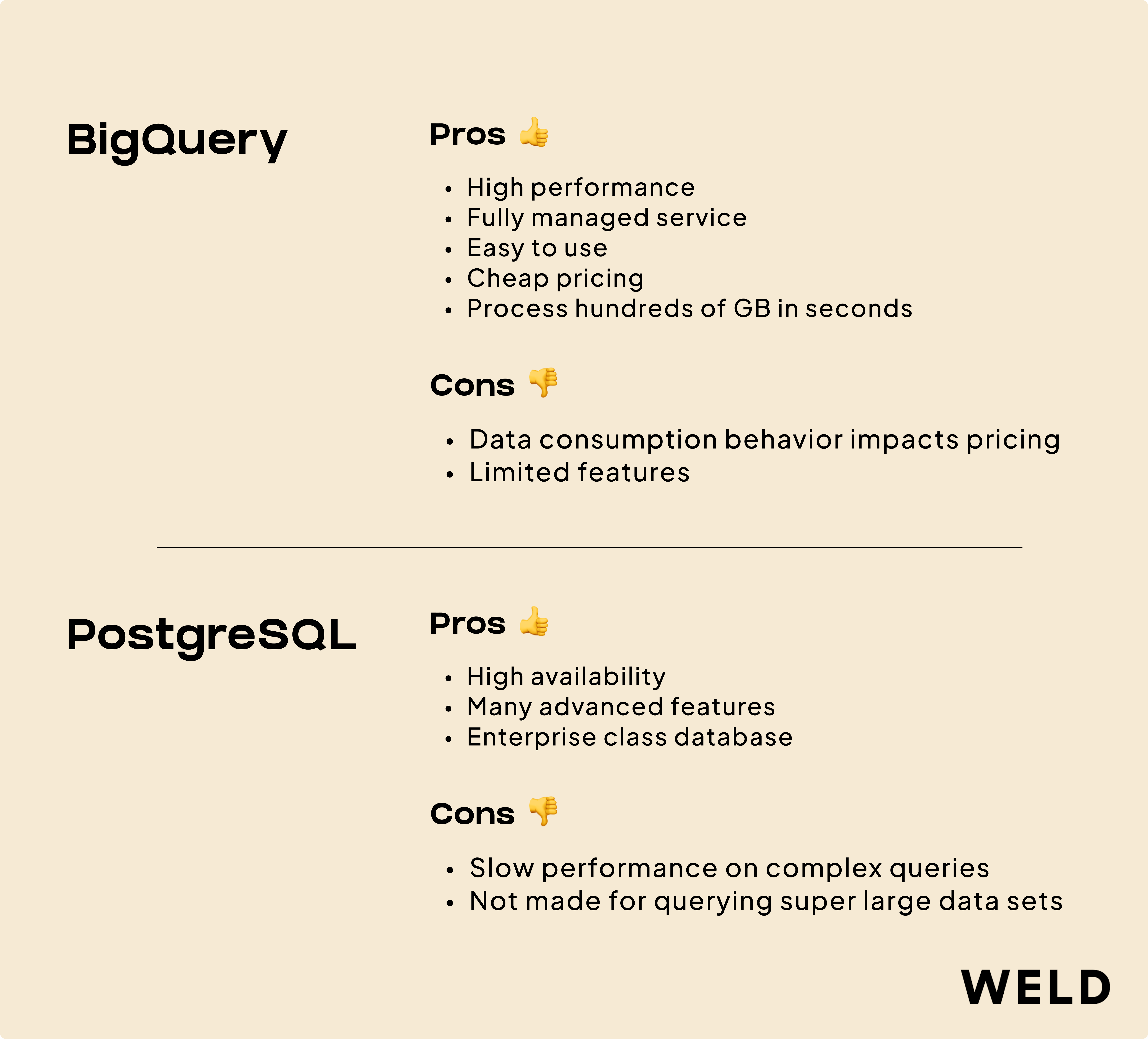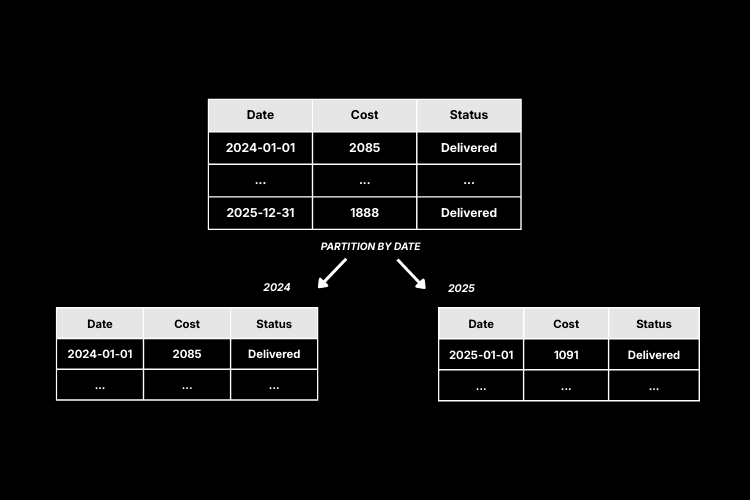Being data-driven has become a common strategy for companies seeking to gain a competitive advantage — and for good reasons. New technologies like Machine Learning, AI, Internet of Things (IoT), on‑demand advanced analytics and robotics are on the rise, and data plays an integral role in enabling these innovations. To achieve these ambitious data goals, much more on‑demand computing power, performance, and cost‑efficient storage that scales with your business is needed. This is why many companies are shifting toward modern cloud data warehouses like Google BigQuery over traditional static solutions like PostgreSQL.
Next generation cloud data warehousing technologies like Google BigQuery, Snowflake and Amazon S3 are gaining popularity not only because of the increasing need for on‑demand data analysis, but also the ever‑growing volumes of data being collected and stored. Keep reading to learn why choosing BigQuery over PostgreSQL as your main data warehouse might be the best option—especially when performance, ease of use, scalability and cost efficiency are on the line.
Table of Contents
- What is PostgreSQL?
- What is Google BigQuery?
- Is PostgreSQL a data warehouse?
- PostgreSQL vs. BigQuery: 3 main differences
- What is Google BigQuery good for?
- The future of data tooling
What is PostgreSQL?
According to PostgreSQL's website, "PostgreSQL is a powerful, open source object‑relational database system with over 35 years of active development that has earned it a strong reputation for reliability, feature robustness, and performance."
Users report that Postgres works excellently for transactional workloads and moderate analytical queries. However, for extremely large or complex analytical queries, you may need either a cloud data warehouse or distributed extensions to scale out its capabilities, although its open‑source nature and stability make it a long‑standing favorite among data specialists.
What is Google BigQuery?
According to Google BigQuery's product page, it's a "fully managed, AI‑ready data analytics platform that helps you maximize value from your data and is designed to be multi‑engine, multi‑format, and multi‑cloud."
Based on user reviews, Google BigQuery is a good option to analyze massive amounts of data, quickly. It can run incredibly fast queries against terabytes of data in a matter of seconds thanks to its powerful infrastructure. It also provides the option to stream data in regularly, or bulk load your data using Google Cloud Storage. More enhancements such as the BigQuery Metastore and AI‑powered data preparation via Gemini have streamlined analytics further. BigQuery has a 4.5 star rating on G2, with users praising its ease of use and performance.
Is PostgreSQL a data warehouse?
An important thing to note is that PostgreSQL and Google BigQuery are actually not in the same product category. While PostgreSQL is what can be described as a traditional Database (and often referenced as the top of its class), Google BigQuery is a Cloud Data Warehouse — the new standard for data management and the hub of the Modern Data Stack.
 Find everything you need to know about how to extract, store, model, and activate data in our Ultimate Guide to the Modern Data Stack →
Find everything you need to know about how to extract, store, model, and activate data in our Ultimate Guide to the Modern Data Stack →
Database vs. data warehouse
In today's business reality where most organizations are managing far greater quantities of data and need a more robust solution to do so effectively, a data warehouse is much better than a database. Top data warehouses like BigQuery, Snowflake and Amazon S3 have separate storage and compute, which means they scale much better when querying vast amounts of data.
PostgreSQL vs. BigQuery: 3 main differences
So what are the main differences between PostgreSQL and Google BigQuery that make BigQuery the better option in the modern world of business data? Let's break it down.
1. Better performance
The main reason Google BigQuery is better than PostgreSQL is performance. Google BigQuery is 100% elastic, meaning that it allocates the necessary resources required on-demand to run your queries in seconds and is highly optimized for query performance.
The downside of on-premise or static solutions is that you’re essentially “stuck” with the resources allocated to your database server. This means you’ll need server engineers to manage and allocate resources. You will never reach the amount of computing power that Google BigQuery has since it’s essentially unlimited.
2. Ease of use and scalability
BigQuery is “serverless” or “data warehouse as a service” which gives you low upfront cost, and improved scalability. It scales 1:1 with your needs and you only pay for what you use. It's super easy to set up and has many native integrations and functionalities.
3. Cost efficiency
BigQuery is a cloud-based, fully managed service which means there is no operational overhead, which provides extremely high cost effectiveness. The pricing model is also easy to understand, and is as follows:
- Compute: You pay $6.25 per terabyte scanned. First terabyte is free.
- Storage: Varies from $10 to $40 per terabyte per month depending on type (active, long-term, logical, physical). First 10GB is free.

What is Google BigQuery good for?
We've seen the same pattern emerging from several customer cases and in our previous work experience. Typically you see a cloud hosted or on-premise PostgreSQL solution with a data-read replica connected directly to a BI tool.
This architecture can work for smaller data volumes and simple queries, but in most use cases and over time, the volume is bound to increase and queries become ever more complex. These solutions result in inadequate performance and even start to time out. Ultimately, a cloud platform like Google BigQuery is better than classic solutions like PostgreSQL, which aren’t unsuitable for modern data warehousing purposes.
"Google BigQuery allows us to process our large datasets programmatically. It can do so without considering underlying resource usage or worrying about causing database locks and timeouts."
– From a BigQuery review on G2
The future requires cloud data warehouse solutions
If you want to make sure you’re prepared for the future, we advise you to make the shift towards cloud data warehousing as a service and modern technologies like Google BigQuery, Snowflake, or Amazon S3. PostgreSQL is loved by many and definitely has its place as one of the best advanced classic data warehouse solutions. But the two are completely different technologies and are made for different purposes.
The most important takeaway is that the way companies use business data is changing. Quantities of data have become massive, and the demand for actionable insights and innovative implementations is higher than ever. And this means data specialists need a robust, scalable toolbox to support their complex work.
What’s next for data tooling?
Moving from databases to data warehouses is one important step in the right direction. But what comes next? Nowadays, most companies rely on a collection of tools to source, extract, store, model, and activate data — but these legacy data stacks are already becoming cumbersome and outdated. Experts spend hours troubleshooting broken connections and patching various software together just to get their so-called modern data stack running.
It's time for a new era of data tooling. And this is why we've built Weld. Weld is an end-to-end data platform with expertly crafted ELT, reverse‑ETL, modeling and lineage functions. If you'd like to see for yourself the power of a data tool built for data experts of today, schedule a call with one of our specialists. We'd love to hear what you think!












